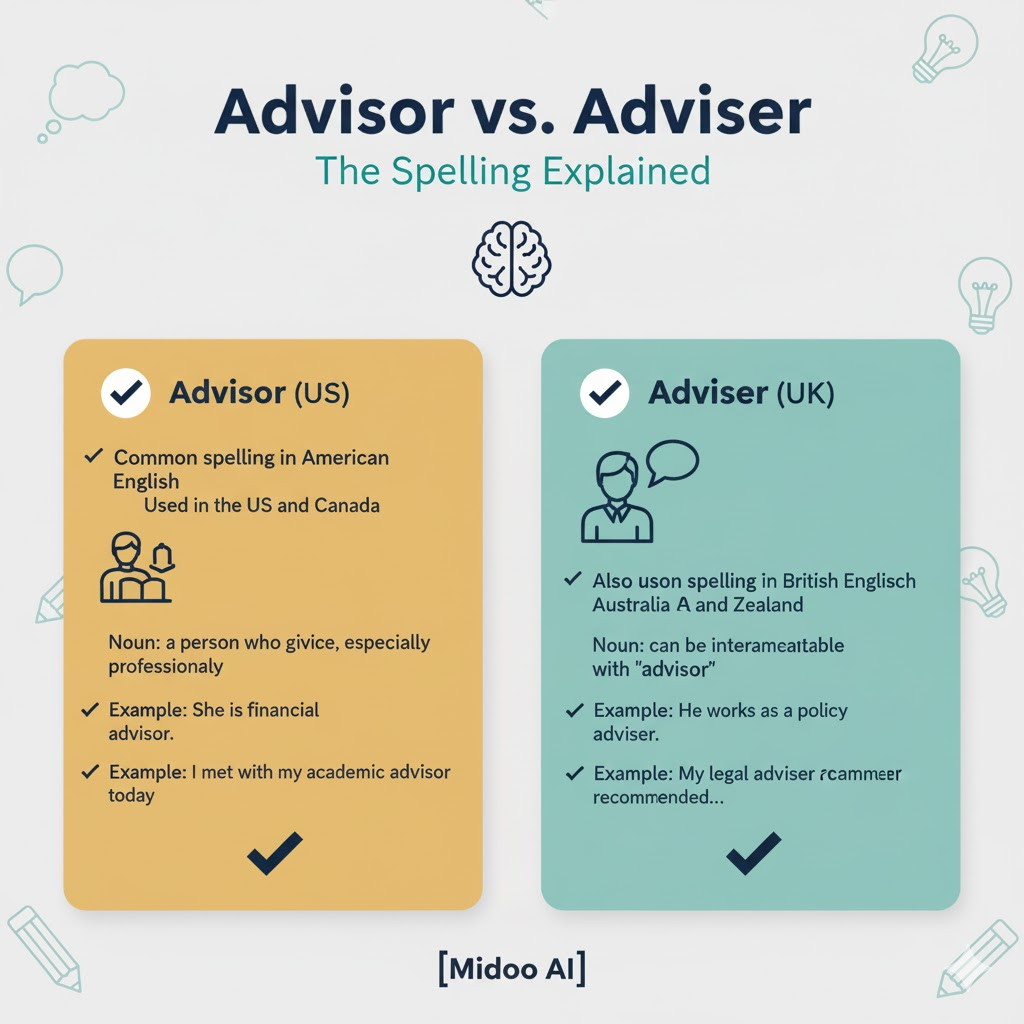Advisor vs. Adviser — Which Spelling Should You Use?

English learners often get confused between advisor and adviser, since both words sound the same and share a similar meaning. At Midoo AI, we frequently see this confusion even among advanced learners, especially in professional or academic writing. Understanding which spelling to use can make your writing look more polished and credible.
In this guide, we’ll break down the difference, show practical examples, provide tips, and answer frequently asked questions so you can confidently choose between advisor and adviser.
1. Core Difference
Both advisor and adviser mean a person who gives advice, usually in a professional or official capacity. However, the difference lies mainly in regional preference and formal usage:
- Advisor → More common in American English and formal job titles.
- Adviser → Slightly older form, more traditional, widely used in British English and in some official documents.
Despite these nuances, both spellings are correct, and readers will generally understand either.
2. “Advisor” in American English
In the United States, advisor is the preferred spelling in almost all contexts, including schools, business, and government.
✅ Examples (U.S. English):
- She works as a financial advisor at the bank.
- The university appointed a new academic advisor for international students.
- He is a trusted political advisor to the president.
- The career advisor gave me excellent guidance.
💡 Midoo Tip:
If you’re writing for an American audience, stick with advisor for consistency. It’s also the spelling used in most U.S. official documents and job titles.
3. “Adviser” in British English
In the U.K., both spellings exist, but adviser is slightly more common, particularly in formal or traditional contexts.
✅ Examples (British English):
- The government has appointed a new economic adviser.
- University students can consult their academic adviser for course planning.
- He served as an adviser to the Prime Minister.
Tip: In British formal writing, adviser is often preferred in legal, academic, and government documents, though advisor is also widely accepted.
4. Quick Comparison Table
| Context | American English | British English |
|---|---|---|
| Professional/job title | Advisor | Adviser (acceptable) |
| Academic guidance | Advisor | Adviser |
| Government/formal documents | Advisor | Adviser |
| General understanding | Both | Both |
5. Common Mistakes
❌ Using “adviser” for an American job title like Financial Adviser of the U.S. Treasury → Americans expect advisor.
✅ Correct: Financial Advisor of the U.S. Treasury
❌ Using “advisor” in traditional British government reports → acceptable but may look modern.
✅ Preferred in UK: The Prime Minister’s senior adviser
Tip: Always consider your audience: American → advisor, British → adviser (for formal contexts).
6. Easy Memory Hack
Think of it this way:
- Advisor → America (both have “A”)
- Adviser → Traditional / British
This simple mnemonic helps you remember which version fits which region.
7. Real-Life Usage
- The U.S. Department of State appointed a senior advisor. (American English)
- Students meet with their course adviser for registration. (British English)
- The President’s foreign policy advisor is highly respected. (American English)
- The government economic adviser recommended new trade policies. (British English)
FAQ
Q1: Are “advisor” and “adviser” interchangeable?
Yes, in meaning they are interchangeable. The difference is mainly spelling preference based on region and formality.
Q2: Which one should I use in resumes or job titles?
- U.S. → Advisor
- U.K. → Adviser (unless you want a modern feel, then Advisor is also acceptable)
Q3: Do Canadians prefer one spelling over the other?
Canada often follows British English, so adviser is slightly more common, but advisor is also widely recognized.
Q4: What about in academic writing?
- U.S. universities usually use advisor (e.g., Academic Advisor).
- U.K. universities often use adviser (e.g., Student Adviser).
Q5: Can I mix the spellings in the same document?
It’s best to pick one spelling and stay consistent throughout your document to maintain professionalism.